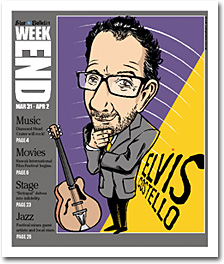MUSIC
COURTESY SHORE FIRE MEDIA
Elvis Costello has kept the creative juices flowing during his long career. He's playing with the Honolulu Symphony Pops.
|
|
Ever-evolving Elvis
He's done it again. There was the affair with country music, the flirtation with soul and then the long marriage to punk. Now, he's infatuated with orchestral music.
Elvis Costello
Performing with the Honolulu Symphony Pops
In concert: 8 p.m. Friday and Saturday
Place: Blaisdell Concert Hall
Tickets: $40 to $90; 20 percent discount for seniors, students and military
Call: 792-2000, (877) 750-4400, or visit honolulusymphony.com or ticketmaster.com
|
Shedding his old skin and slipping into a new musical genre every few years is nothing new to this surly, snappish Briton, Elvis Costello. Unwilling to commit to just one musical style, he's headed out on new musical adventures again, joining orchestras around the country through May.
As part of a 13-date tour that kicked off Sunday in San Francisco, Costello comes to Oahu for two shows at the Blaisdell Concert Hall with the Honolulu Symphony Pops. Together they will plow through "My Flame Burns Blue," the eclectic musician's latest release, which is chock-full of remakes of personal favorites from his nearly 30-year career.
Matt Catingub, conductor of the Pops, said the group is in rehearsals tonight and Friday. Catingub said he has followed Costello's music throughout the years and is "very much looking forward" to the performances. "Elvis is a marvelous musician and I'm glad Hawaii is going to get a chance to hear just how versatile he is. Elvis has orchestrated much of the music himself."
Each show on this short tour starts off with a suite of music from "Il Sogno," Costello's first attempt at a full-length orchestral work, 45 minutes of which is on a bonus CD accompanying "My Flame Burns Blue." After that, Costello will return to the stage with his guitar and longtime pianist Steve Nieve, backed by the orchestra. There will likely be a few other Costello goodies thrown in, though much of the show will concentrate on "My Flame Burns Blue," a CD Elvis made with Metropole Orkest, a jazz orchestra from the Netherlands.
"This record may explain what I've been doing during the last 12 years when I haven't had an electric guitar in my hands," Costello said in the liner notes of "My Flame Burns Blue."
His is a life that has included three marriages and bouts with rock 'n' roll excess -- his bitter, ironic observations immortalized in so many of his songs. But these days it's all about sincerity, and lately Costello has very few interests outside his orchestral music, even telling interviewer Paul Rambali of The Face that he doesn't feel he has time or energy for other pursuits: "I figure this as a job. And I think too many people that do this job just sit around waiting for the next compliment. And I like to be involved. I like to be active all the time."
Though he may be better known for his collaborations with backup bands the Imposters and the Attractions, this is not the first time Costello has taken up with orchestras. He has also been commissioned by the Royal Danish Opera to compose "The Secret Songs," based on the life of Hans Christian Andersen.

MAR. 31-APR. 2 |

|
Costello made his first real splash on the U.S. side of the pond with the 1989 album "Spike," his 21st release. But Costello has said he's always had classical music in his blood. Leaving behind the comforts of punk and new wave long ago, his venture into orchestral music has been a few years in the making, and it's been a seamless progression so far, with no complaints from reviewers. He's received plenty of praise for "Il Sogno," a 2004 recording of his adaptation of "A Midsummer Night's Dream." The music was commissioned by the Italian Dance Company in 2000 for a production that toured parts of France, Russia and Italy.
"Costello knows his way around an orchestra," said one New York Post review. "The writing is full of color and variety and solo instruments get their fair share of the spotlight. ... There are all sorts of style references -- luxuriantly romantic passages, outbursts of Ivesian exuberance, sudden turns into Latin rhythms, sturdy marches, a couple hints of Elizabethan ballad. The work goes all over the place, but it's a fun trip."
Though Costello has earned himself a reputation for flouting social conventions -- snapping at the occasional journalist or fan who dares ask a seemingly stupid question -- he's willing to explore new territories and collaborations with partners such as Paul McCartney and Burt Bacharach.
He plans to release a CD in June called "River in Reverse," which he worked on with New Orleans musician Allen Toussant.
"The songs that I love, some are more off the beaten path," Costello told Keith Spera of the New Orleans Times-Picayune in January. "Even Allen expressed surprise at a couple of my choices. That doesn't mean they shouldn't be heard again. And when you hear the record, you'll understand why."
COURTESY SHORE FIRE MEDIA
|
|
IT'S A kinder, gentler Elvis Costello -- at least musically -- who's dropping into concert halls around the country these days. But it's been a battle for respectability in the United States for the 2003 Rock & Roll Hall inductee. He first attempted to get the attention of Columbia distributors in 1977 by holding a solo protest in front of their offices (and was promptly arrested by police).
Many of his early hardships were his own fault, beginning with a legendary incident in which he brazenly called James Brown "a jive-ass nigger" and later Ray Charles "an ignorant, blind nigger." (He later explained the comments away as drunken behavior, apologizing in the liner notes of his fourth album, the 1980 release "Get Happy.")
There was also that little misunderstanding in 1977 on "Saturday Night Live" when, as a last-minute replacement for the Sex Pistols, he and the Attractions played the song "Radio, Radio," an anti-corporate song he didn't have clearance for. It was a good 10 years before he was invited back to perform music off the college-friendly "Spike."
But in 2003, he told Simon Hattenstone of the Guardian that while the venom of his earlier days made for good publicity, his intentions were misconstrued: "A lot of the songs early on were more disappointed that anybody would fall for the cliché of romance or fashion or a cheap version of love. ... I love a lot of the songs I wrote then, I still sing them, but there's room in the world for lots of different points of view, lots of different types of expression, even inside the repertoire of one songwriter and singer."

